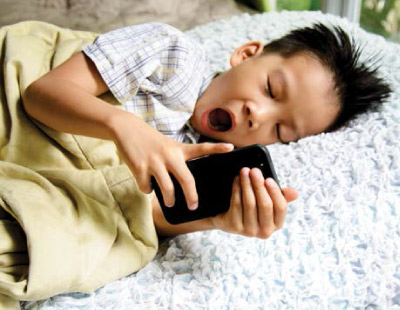The first two years of your child’s life is a critical time for his brain development. Parenting should always be done with a hands-on approach.
Delegating the TV or electronic gadget to be a ‘parent’ will only stifle his early development – he needs to be allowed to explore, play, and interact with real people (e.g. parents, siblings, other family members) to encourage healthy physical and social development. Research has also indicated that excessive usage of electronic gadgets can result in detrimental effects to a child’s development (mental, physical, emotional, etc.).
Limit Screen-Time
The American Academy of Pediatrics (AAP) recommends that parents establish “screen-free” zones at home by making sure there are no televisions, computers or video games in children’s bedrooms and by turning off the TV during dinner. Children and teens should engage with entertainment media for no more than one or two hours per day, and that should be high-quality content. It is important for kids to spend time on outdoor play, reading, hobbies, and using their imaginations in free play.
The AAP recommends that infants and children below two years old should not be exposed to any kind of screen (e.g. TV, smartphones, or any other electronic devices with screens). Since a child’s brain will rapidly develop during these first few years, children should learn by interacting with real people and not inanimate objects, i.e. screens.
It also recommends that children aged between two and five years should not be exposed to screens for more than an hour daily, while children aged between five and 18 years should not be exposed for more than two hours a day.
Keep it ‘Real’ not Virtual
Allowing unrestricted screen time will leave him with less time for other important activities such as exercise, studying/reading, doing homework, or spending quality time with family and friends. However, allowances may be made if your child needs to use a computer to do his homework. Do bear in mind that the real danger comes from non-educational or leisure screen-time.
Light emitted from electronic devices disrupts our sleep cycle (also known as circadian rhythm). Nothing beats a good night’s rest so if you are in the habit of watching TV or checking your Facebook or emails before you sleep, the light from the screen can disrupt not just the quality of your sleep, but also that of the people around you (i.e. your spouse and child). Similarly, exposure to screen activities prior to sleep affects the duration and quality of sleep of your child, often leaving him feeling tired, moody and lacking attention the next day.
A double-edged sword
Before you decide to lock all your electronic gadgets away, there are some positive aspects. It can be a useful learning tool which can aid your child’s development, provided care is exercised in its usage. As parents, you will need to constantly monitor your child’s screen-time to ensure that he does benefit from its use and that he is not abusing his privileges.
Not everything digital is bad provided you exercise some caution in how you allow your child to use it. Used correctly, electronic gadgets make great educational tools. Do take note, however, that it is very easy for your child to abuse his screen-time privileges, so it is up to you to take on the policing/monitoring role seriously.
Some of the drawbacks of consistently indulging in too much screen-time include:
- Obesity – when your child spends more time with electronic gadgets, he will spend less time on physical activities, not to mention the possible habit of eating while enjoying his screen-time. It is easier to overeat as he will not be focused on his meal and the lack of physical activity also increases his risk of becoming overweight/obese.
- Irregular sleep – having too much screentime can disrupt your child’s sleep as he may have trouble falling asleep or develop an irregular sleep schedule. A lack of sleep can cause fatigue or lead to an increase of snacking.
- Behavioural problems – studies have shown that children who spend more than two hours daily on the TV or computer tend to have more emotional, social and attention problems.
- Violence – over-exposure to violence on screens will also desensitize children to violence. This may result in children learning to accept violent behaviour and viewing it as the right way to solve problems.
- Less time for play – spending too much time on electronic gadgets leaves your child with less time for active, creative play.
Tips on screen-time use:
- Always preview the content to ensure it is appropriate for your child. One thing to keep in mind is that your child may not learn the intended lesson from the content, so you will need to have a ‘debriefing’ session with him to recap.
- Do not leave the TV programme on in the background. Researchers have found that leaving a TV on in the background will distract children even if they are not watching it. Furthermore, parents were also found to spend less time interacting with their child if the TV was on and the quality of the interaction between parent-child also decreased.
- If your child is old enough to use the computer for his school work, either limit his screen-time or ensure that he takes frequent breaks, preferably every half hour, whenever he uses it (preferably to do some calisthenics or light physical activity). There is plenty of evidence linking the risks of obesity with sedentary activities such as long hours of computer usage. There is also the added risk of suffering injuries to the eye, neck, back, or wrist.

Caution!
Scary or upsetting (e.g. violent programmes, etc.) shows or content may disrupt his sleep and later development. Researchers found that children exposed to TV with adult content at age one subsequently did poorly on cognitive tests at age four. Similarly, four-yearolds who watched these TV shows also scored poorly on the same cognitive tests.
The ‘Gift of Boredom’
Nowadays, the danger lies in being over-stimulated. Children need to learn how to deal with boredom. By letting your child learn to cope with his boredom, he will be able to attain greater self-sufficiency and be less likely to become a digital addict.
If your child does have free time on his hands, here are some ideas on what you can encourage him to do with his boredom:
- Get physical – play tag, badminton, futsal, or any other physical game. Not only will the exercise benefit him, playing together with him also gives you a unique bonding opportunity.
- Get social – encourage him to go out and interact with other kids around his age. Social media (e.g. Facebook, etc.) is a virtual world and cannot replace the real world which teaches us life lessons.
- Get a hobby – this can run the gamut from arts and craft, fishing, flying kites, collecting things (e.g. stamps, etc.), bird watching, astronomy, cooking, photography, music, gardening, and the list just goes on and on.






Comments